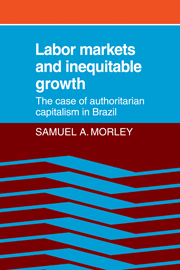Book contents
- Frontmatter
- Contents
- List of tables and figures
- Preface
- Part I Growth, employment creation, and inequality in Brazil
- Part II The effect of supply and demand on labor markets during rapid economic growth
- 6 Migration and the modernization of the agricultural labor force
- 7 The absorption of migrants into the urban economy
- 8 Trends and theories of the wage differential during economic growth
- 9 The market for skilled labor
- 10 Agriculture, wage policy, and the wages of unskilled labor
- 11 Additional perspectives on inequitable growth in Brazil
- 12 Conclusions
- Data appendix
- Bibliography
- Index
11 - Additional perspectives on inequitable growth in Brazil
Published online by Cambridge University Press: 07 October 2011
- Frontmatter
- Contents
- List of tables and figures
- Preface
- Part I Growth, employment creation, and inequality in Brazil
- Part II The effect of supply and demand on labor markets during rapid economic growth
- 6 Migration and the modernization of the agricultural labor force
- 7 The absorption of migrants into the urban economy
- 8 Trends and theories of the wage differential during economic growth
- 9 The market for skilled labor
- 10 Agriculture, wage policy, and the wages of unskilled labor
- 11 Additional perspectives on inequitable growth in Brazil
- 12 Conclusions
- Data appendix
- Bibliography
- Index
Summary
Growth in Brazil increased inequality. That, I have claimed, was virtually inevitable given the presence of unskilled labor and the skill intensiveness of the growth strategy followed. An increase in inequality should be expected when a labor-surplus economy has a period of very rapid growth. Yet at least two other capitalist economies, Taiwan and Korea, starting from a dualism as severe as that in Brazil, managed to grow even more rapidly than Brazil without an increase in inequality. They found a way to combine growth and equity. What did they do that Brazil did not? A comparison between these two countries and Brazil gives valuable perspective on both the nature and inevitability of inequitable growth in dualistic semiindustrialized economies.
A second question that must be addressed is: What happened in Brazil after the miracle? Brazil's was a grow first, distribute later strategy. Not surprisingly, growth increased inequality when it occurred in the presence of surplus labor, but the evidence suggests that Brazil's surplus-labor phase was over around 1973. What happened to inequality? Did the trickle down of benefits increase? In the second section of this chapter, we examine available evidence seeking answers to these questions.
Equitable or inequitable growth: a comparison of Brazil, Taiwan, and Korea
When an underdeveloped economy begins to grow, inequality usually increases. The simple transfer of labor from agriculture to higher-income urban employment reduces the share in national income of those remaining in agriculture. This increases inequality. In addition, wage differentials tend to widen in favor of urban workers during the early stages of growth, thus exacerbating the tendency toward greater inequality.
- Type
- Chapter
- Information
- Labor Markets and Inequitable GrowthThe Case of Authoritarian Capitalism in Brazil, pp. 266 - 284Publisher: Cambridge University PressPrint publication year: 1983



